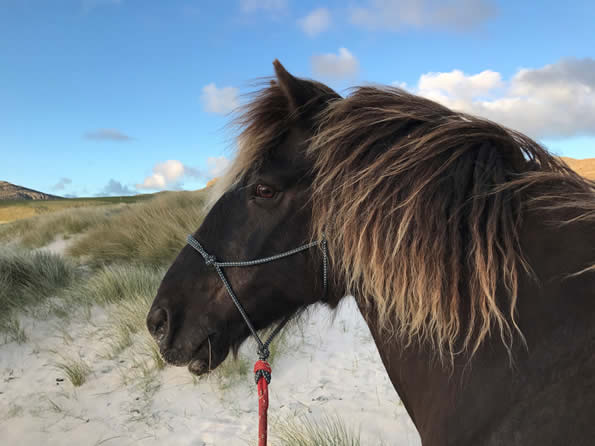Creative non-fiction - Urram

(extract from Marram, a travel memoir, published in The Island Review, May 2018)
theislandreview.com/content/urram-leonie-charlton-barra-scotland-non-fiction
We’d left the road and were riding down a grassy track to the burial ground on the point at Gob Burgh. The ponies were striding out, looking all around them, their hooves making soft thuds on the sandy soil. We passed a sheep track that trickled through the machair to a single standing stone, clearly a favoured rubbing post. There was a long fenced off potato strip, the sandy soil piled up in neat ridges, tattie shaws just starting to show. Then, between Ross’s ears, a huddle of crosses showed up on the skyline against a pewter sea. They were all facing us, eastwards, to the rising sun. The graveyard was enclosed by a tall dry-stone dyke. It had fallen down in places and the ubiquitous strands of barbed wire were strung across the gaps, ribbons of last years’ silage bale wrapping fluttered in the wind like Tibetan prayer flags. A plaited fisherman’s rope lay in recumbent coils between the dyke and the shore. It was melded into the shoreline, its hemp spirals sewn through with moss and silverweed. Alongside it boulders that had rolled from the wall were embossed in yolk yellow lichen - cat’s-tongue rough to the touch.
We got off and led the ponies round to a gate on the far side of the burial ground. A sign told us it was a commonwealth graveyard; that casualties from both the first and second world wars were buried here. I wandered amongst the stones, listening, touching, reading. The lettered, dated summations of lives, short-lived and long-lived, were being taken over by lichens, some like smooth spillages of cream, others sage-green and wiry. The air was strung with the oscillating calls of curlews, and lapwings flung themselves in somersaults against the wind. This place of remembrance was a sanctuary for birds. I felt a sense of privilege to be there that was almost too much to bear. We walked towards the tip of the point, the carved gravestones replaced by body-sized rocks left by the sea, or glaciers, or maybe both. A curlew whistled in alarm and we stopped. The sky was full of birds watching over their nests, I had a sense of trespassing on hallowed ground. The bird calls escalated echoing my own sense of wonder. As we retreated a slender head and neck peered at us from above a rock, there was something strangely adolescent about this bird, it wheeled up, all awkward elegance before the sky stole it. Later, the bird book told me it was a Godwit.
We walked back in the lee of the wall, underfoot was a mixture of dried cow dung and sand, a refuge for cattle in the winter months. We left quietly through the gate, its metal rungs holey with rust, and an arctic tern trailed its long tail with impossible grace in the air above us. Shapeshifter I thought, as a fine rain blew across our faces.
The curlews’ spiralling calls had tuned me in to a world tilting ever-so-slightly differently on its axis, a world I wanted to know more deeply, and one I’d need to learn a new language to explore. Shuna had told me down at the graveyard that Karen, her sister in law, had family buried there. Karen’s mother had left Barra when she was sixteen to go and work in the hotels in Oban. She had been ashamed of her Gaelic - as many were at that time - and hadn’t spoken it in the home. In spite of this, or perhaps because of it, Karen herself had gone on to become a world-renowned Gaelic singer and ambassador for the language. Her last album was a return to her Hebridean roots, recording traditional songs and poems. She had called the album ‘Urram’, the Gaelic for ‘respect’ and ‘honour’. Urram, what a beautiful word.
‘Look, I can post my cards.’ We were back on the tarmac road and Shuna was pointing to the postbox on the verge ahead. She leant over and posted from the saddle, delight spreading across her face. I laughed at the improbability of it all. At us, there, Michelin women padded out in full waterproofs, our faces red-ruddy from the wind. At the two glossy postcards sent on their way at the end of a quiet township road on Barra. As the road cut inland the surge of beryl sea on our left was replaced by fields and stock fences. In places each barb on the wire was coated in sorrel cattle hair, like felted pearls. ‘Allasdale,’ said Shuna, looking at a road sign ahead, ‘I read what that means, elves’ milking place, from the Norse’. I drank in the words. Elves’ milking place. I imagined them nipping in and milking the cattle, their fair dues, for what, I wondered.



